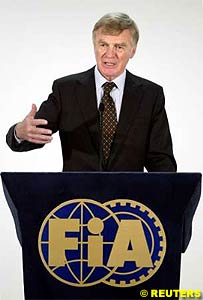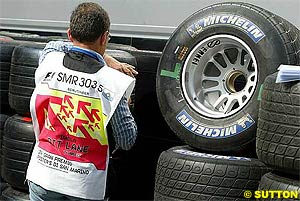Atlas F1 Magazine Writer
Fresh from the Formula One paddock
Tuesday in Monte Carlo was make or break for Formula One, and the outcome of the summit held in the hallowed halls of the Automobile Club de Monaco was, by all accounts, a coup for FIA President Max Mosley.
Mosley's full statement is reproduced in full on Atlas F1 and, as such, this column does not concern itself with what it says, save to comment that what was agreed effective 1 January 2008 really did not really require agreement - as Mosley himself stated last week - for, as from that date the Concorde Agreement as Formula One knows it is dead and cremated. Freed from its restrictive shackles the FIA can, from then onwards, regulate Formula One in any way it sees fit; put bluntly, if it wishes to enforce 50cc single cylinder two-stroke engines driving three caterpillar tracks via hydro-magnetic clutches, it is totally at liberty to do so.
So yes, from 01/01/2008, 32 valve 2.5 litre V8s fitted with standard electronic control units will probably happen; steel brake discs will doubtless be fitted to lighter chassis; electronic driver aids will in all likelihood be outlawed, as will the choice of tyre suppliers or compounds. Team bosses who don't like it (the new Formula One), can lump it or go into late retirement.
But, that date is a long way off, yet…
So, what this column does concern itself with is what was NOT said by Mosley, or that which is earmarked for introduction before the expiration of Concorde. And that makes for interesting reading.
On the engine side, despite reports to the contrary elsewhere, the sport may still be entertained by the shrieks of 3.0 litre V10s for the next three years, with the only changes being to life expectancy - much like an extended version of the present single-engine-per-Grand Prix ruling - while standard ECU's may be introduced in the interim. Forget not, any change of engine regulation will cost dearly at this stage - particularly as manufacturers have budgeted for three more years with present formats. Sure, a later change to V8s would still cost mega-millions, but who is to say that Manufacturer B, F, F/J, H, M, R or T would still be in Formula One come 2008? So, that may kick against their acquiescence for change.
And, they have every legal right to insist that Concorde (as it stands) is enforced, particularly when certain marketing platforms (BMW's to-be-introduced M5 V10, for example) depend upon that stability. Ditto electronics, which the company showcase as examples of bi-directional technology transfer, with certain control boxes being common to both Formula One and road car programmes. These are but two examples; with the German company being by no means the only sufferer should Formula One adopt the suggested format within the next three years.
On attracting new teams to the sport, no details were made available as to how and when that would/should be achieved, but rumours abound that Christian Horner's Arden Formula 3000 outfit (the formula dies this year, to be replaced by the oddly named GP2) is actively seeking a budget of $60m to enter Formula One sooner rather than later. So, okay, the $48m bond can be deleted at the stroke of a pen but, still, will $60m be enough to set up a team and run same for a year (or more) before Mosley's mandated cost-saving measures take effect? Even if they are allowed to purchase chassis, what about engines and electronic costs?
And, just what will Horner (or others in his situation) do in the interim? Gear up to run the much-vaunted GP2 for two years, then disinvest and go Formula One? Close up their Formula 3000 shops and kick around for three years whilst awaiting the 'new' Formula One? Surely better to maintain the technical regulations for both formulae fundamentally as-is, then switch both in 2008? That would enable aspiring Formula One teams to step up at a logical time, whilst creating openings for others to fill their voids from below.
So much for the technical aspects; what about the rest, such as GPWC, qualifying and tyres?
"Everything the GPWC set out to get, they have got," Mosley is reported by Reuters as saying. "Their raison d'etre has disappeared," he added with reference to the manufacturer body, which withdrew from talks with Bernie Ecclestone last weekend and threatened to go its own way from 2008.
Has it though, or has the GPWC merely been strengthened by 'getting' everything it set out to get? Sure, its future as a 'breakaway' series promoter may, crucially, be superfluous, but not its role as a collective bargaining platform for the five manufacturers (or seven if Honda and Toyota join in) presently in the sport, for just when will they view 'everything' as enough?
Rumoured to be demanding as much as 70% of Formula One's annual revenues, would the GPWC - run by fairly hard-headed people, remember - be happy with 'only' 50% (teams presently share an estimated 23%); indeed, would Ecclestone, embroiled in legal battles with the shareholding banks owning 75% of his company, be happy to part with an additional 25% or so of income? Doubtful in both instances, and more so after a meeting - with a very full agenda - lasting, at most, eight hours.
That qualifying needs to change is pretty clear, and that it needs to change soonest is even clearer, but to what, exactly? No details were contained in Mosley's statement, and, forget not, the problem with Qualifying ala 2004 is not the flying lap format, but the fact that cars are weighted down by fuel and restricted by engine running time. Change either of these requirements, and you need wholesale overhaul of this season's sporting regulations - and, that requires 100% agreement in terms of Concorde…
Finally, a word on tyres. Sure, many would love to see a single tyre supplier but, remember, some of the best races have come just as Bridgestones have gone 'off' and Michelins come 'in' (or, in times past, as Goodyear or Pirelli have provided differing characteristics). Equally, rubber performances in variable weather have provided speculation (by 'the man down the pub' as Mosley referred to it last year); eliminate these factors and you eliminate unpredictability - and that is what all sport is about. Remember, fuel stops were mandated to add unpredictability; under the new proposals tyres are regulated to remove it...
As with the GPWC settlement that wasn't, the devil is in the detail and, unfortunately, information from Tuesday's meeting is light on detail.
Remember Tyregate in September last year? Well, here is a statistic: the Hungarian round - which sparked off the wide-tyre issue - at the back end of August, was the last race won by Michelin. Since then the Ferrari/Bridgestone combination has won seven Grands Prix, and seems set to make it a few more.
Then this year, McLaren has experienced a mysterious handling imbalance on its MP4-19, and both Fernando Alonso and Jarno Trulli have complained of their Renault R24s being 'difficult at the limit'. In fact, the Italian was even more outspoken: "you never really know whether you're on the limit or not. It doesn't matter if you make a mistake or drive on the limit - you never know where the limit is," he told Autosport during the Imola weekend.
Juan Pablo Montoya, too, has complained of similar characteristics on his Williams, whilst Ralf Schumacher has not been a happy bunny of late. The common denominator is, of course, that all three teams won at least one race each (and seven between them) on their French rubber prior to Tyregate.
So, seven for Michelin before Tyregate, and seven on the trot for Bridgestone since. Of course, this statistic may be purely coincidental, but I don't totally believe so: if it walks like a duck and quacks like a duck, it normally is a duck.
Consider the timing: around September teams firm up their designs and prepare for the manufacturing process. McLaren, in fact, had already frozen its design and was in the throes of building MP4-19 - a straight-forward evolution of the 18 which, of course, had been designed for the tapered tyre design - whilst Williams was the first team to launch a totally new car (and a radical one, at that) in January (on 05/01/04, in fact), so must have commenced manufacture in September.
As for Renault it, too, would have drawn on known data when designing the R24 - its dual design team philosophy was laid down by Mike Gascoyne to design a car in alternate seasons, so the foundations for R24 were laid down in 2002. Immediately after Michelin introduced the taper tyre, in fact…
"But what about BAR-Honda's scintillating performance on Michelin's?" I hear you say. Well, as the team only received clearance to run Michelin's in November, 006 was designed to run on (Bridgestone's) narrow profile. Enough said?

 Just getting 31 of the sport's most influential personalities - Toyota, for example, sent TMG Chairman Tsutomu Tomita, President John Howett and engine and chassis directors Luca Mamorini and Mike Gascoyne - around a single table on a single day is a remarkable achievement; then consider that Mosley had suggested they pencil in Wednesday, too, lest matters spill over. In the event they did not, which enabled the former patent-law barrister to state, late on Tuesday, that "really I couldn't have asked for more from the meeting."
Just getting 31 of the sport's most influential personalities - Toyota, for example, sent TMG Chairman Tsutomu Tomita, President John Howett and engine and chassis directors Luca Mamorini and Mike Gascoyne - around a single table on a single day is a remarkable achievement; then consider that Mosley had suggested they pencil in Wednesday, too, lest matters spill over. In the event they did not, which enabled the former patent-law barrister to state, late on Tuesday, that "really I couldn't have asked for more from the meeting."

 At Monza, the next race, all Michelin runners were at a disadvantage, despite comments to the contrary and, come Indianapolis and Suzuka, weird weather scuppered any meaningful comparisons.
At Monza, the next race, all Michelin runners were at a disadvantage, despite comments to the contrary and, come Indianapolis and Suzuka, weird weather scuppered any meaningful comparisons.
|
Contact the Author Contact the Editor |
Please Contact Us for permission to republish this or any other material from Atlas F1.
|
Volume 10, Issue 18
Articles
Every Other Sunday
The Paint Job VI
2004 Spanish GP Preview
2004 Spanish GP Preview
Spanish GP Facts & Stats
The F1 Trivia Quiz
Columns
Rear View Mirror
Bookworm Critique
On the Road
Elsewhere in Racing
The Weekly Grapevine
> Homepage |
